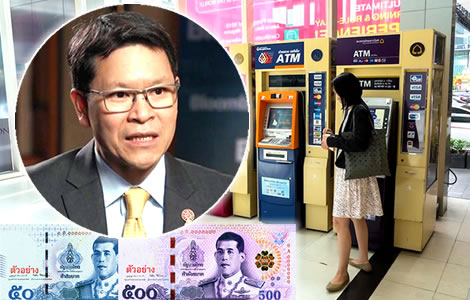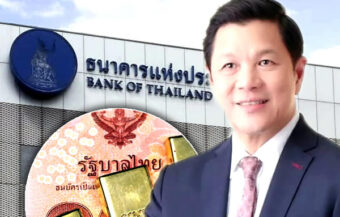It comes as the Bank of Thailand Governor points to ‘disappointing’ prospects for 2020 as the bank reduced its forecast for this year and next. There are some glimmers of hope such as the prospect of a US-China trade deal and some forecasts of a weakening baht but also dark clouds in the form of rising costs for ordinary Thais and the prospect of political turmoil.
As growth prospects are cut again for both this year and next, comes a survey which might explain part of the reason why the slowdown in Thailand’s economic growth and contraction of exports has caused consumer confidence in the kingdom to plummet this year. A fascinating study of Thailand’s bank accounts from 2017 showed that nearly 5 million had a funds balance of less than ฿50 while nearly 19% had less than ฿500. The survey highlighted that the top 10% of bank accounts with ฿3 million or more accounting for 93% of all the money available.

The Governor of the Bank of Thailand Veerathai Santiprabhob has described prospects for 2020 as ‘disappointing’ after the central bank held interest rates at 1.25% but indicated that future easing may be possible if the economic situation continues to deteriorate. The bank revised its projected growth rate for 2019 to only 2.5% and predicted a growth rate of only 2.8% next year.
Bank of Thailand concerned about lower levels of employment in factories feeding into the economy
The bank boss acknowledged that the key influencing factors for the Thai economy were the strength of the Thai baht, trade disruption in Asia and across the world as well as a slowdown worldwide.
He was particularly concerned about reduced employment levels and reports of workers being hired on flexible working terms with lower incomes as the manufacturing sector struggles to adapt to the fall-off in exports.
Bank has been buying US dollars to keep the Thai baht in check which has seen foreign reserves rise
Mr Veerathai was addressing a business seminar in Bangkok and suggested that Thailand should be growing by up 4% per annum.
He also pointed out that the bank was actively engaged in managing the Thai baht to such an extent that Thailand’s foreign reserves will go up considerably this year as the bank has purchased US dollars to keep the super baht in check.
He said that executives at the bank were limiting the scope of these activities to avoid unintended side effects or the prospect of Thailand being seen as a currency manipulator.
Faint glimmers of hope for 2020
There are some faint hopes in the horizon such as a belief by bank officials and larger commercial banks and financial institutions worldwide, that the Thai baht will decline in 2020.
Rabobank, which has been quite prescient this year in its forecasts, suggests a value to the dollar of ฿33 by the end of the year. This contrasts with the prevailing judgment of Thai forecasters in the financial sector who say that the baht will continue to strengthen hitting ฿28.5 to the dollar in the same period.
Chinese moves may signal the first stage agreement with the United States and a better trade conditions
On Tuesday, China made a move to cut tariffs and introduce more competition into its markets. This is seen as an opening move towards the long-anticipated and often postponed ‘stage one’ US-China trade deal.
On Monday, US President Donald Trump said the interim deal would be signed ‘shortly’ by representatives of both countries.
There have also been, in recent weeks, signs of a pickup in business confidence in some European countries including Germany and of course the United States remains buoyant.
Increased problems for 2020 may include political instability and higher costs for lower-income workers
However, some new problems are emerging in Thailand. One is the prospect of more political turmoil. The other is a growing list of indicators suggesting that the real cost of living, in spite of government data, is rising significantly for ordinary Thai people who depend on the black economy for goods and services and who have been hit by higher indirect taxes of staple grocery items.
65% of those surveyed in a NIDA poll some weeks ago said that this was their biggest concern right now ahead of any other issue.
2019 – economists have struggled to explain the sharp effect of what has only been a deceleration
Throughout the year, many economic thinkers have struggled to explain the disconnect between the economic data which the Thai government quite rightly points out is not catastrophic and the heavy impact that has been felt among most ordinary Thais because of the slowdown.
Black economy used by less well of Thais
The answer, of course, is that it is many factors. Among them is that many Thai households are highly leveraged with debt. There is also evidence to suggest that smaller traders and food outlets which represent a huge proportion of the black economy have raised their prices to cope with the nudge downward in business volume.
Inequality in Thailand heightened the impact on the less well off – study of Thai bank accounts form 2017
The essence of the explanation lies in the country’s chronic inequality. This was highlighted this week in a fascinating and valuable study conducted by the Puey Ungphakorn Institute, a respected organisation in Thailand which specialised in economic research.
The study looked at 80 million bank accounts in Thailand from June 2017 which contained ฿12 trillion in funds. It showed that nearly 5 million accounts had less than ฿50 in funds while a further 12.2 million had less than ฿500 or $16.50.
The survey revealed that 10% of accounts with ฿3 million or more accounted for a colossal 93% of all the funds.
Snapshot of Thailand’s inequality problem and a better understanding of the real Thai economy
The survey is, of course, a snapshot of Thailand’s inequality problem which the government is tackling. This is also a simple survey of bank accounts and not people, therefore, offering limited insight.
However, it does illustrate that a large segment of the Thai population is, in fact, living in a parallel economy that has been disproportionately impacted by the slowdown in growth.
It also shows that 90% of Thai account holders are managing a paltry 7% of the funds in the banking system. At the same time, it highlights that even beyond this inequality there is an underclass of 19% of Thai bank account holders.
Beyond this again, only 56% of Thai people are reported to have a bank account. The remainder of the population is left to make use of cash and loan services from unofficial lenders and loan sharks.
Further reading:
Moody’s – debt is 98.5% denominated in Thai baht as two views of the economy are at odds


















